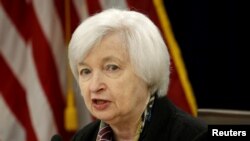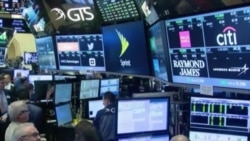Top U.S. economic officials gathered Tuesday in Washington to debate how best to speed up economic growth without sparking inflation or stock market chaos.
Most economists expect the U.S. Federal Reserve will keep a key short-term interest rate at the current low level when its decision is announced Wednesday. It's also expected to trim the forecast for U.S. growth.
U.S. central bank officials say they are considering many kinds of domestic and international economic data as they decide where to set the federal funds rate, which is the rate at which banks and other depository institutions lend money to one another, generally on an overnight basis. Changing it can affect growth, stock prices and home sales, among other things.
Tuesday's report on U.S. housing starts, for example, showed a decline in August. It was just the latest of several important economic reports that were either tepid or disappointing. The slower-than-expected growth is making the Fed move much more slowly than investors and others predicted last December, when the central bank raised interest rates very slightly from the emergency low level put in place during the recession.
Rabobank analyst Jane Foley said, "If we go back to the start of last year, the market was anticipating the Fed would start hiking last June and start hiking progressively from that. Now, of course, the inability of the Fed to do that really is linked with the outlook for the global economy."
Most economists say a rate hike is unlikely Wednesday.
But Michael Jones of the Riverfront Investment Group says he expected the Fed to use "some hawkish [pro-rate hike] language that sort of sets the stage for future rate increases." The next two Fed meetings are set for November and December, and experts quoted in the financial press said December was the most likely time for an increase.
Central bankers use low interest rates like an accelerator pedal to boost economic growth and higher interest rates sort of like a brake to keep the economy from crashing into high inflation or unrealistic stock values.
Meanwhile, officials of the Bank of Japan, which sets interest rates for the world's third-largest economy, were meeting to consider whether to cut rates further into negative territory or take other unconventional steps to bolster economic growth there. They have been working to stimulate Japan's faltering economy for some time.






